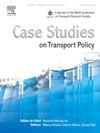Exploring the dynamics of the transport system energy consumption in Australia − A preliminary systems modelling effort
IF 2.4
Q3 TRANSPORTATION
引用次数: 0
Abstract
In the face of an ever-increasing trend in the Australian transport demand with minimal improvement in fuel efficiency, petroleum products continue to dominate the primary energy source for the transport sector. The persistence of this reliance hinges on the urgent formulation and robust implementation of effective policies. This paper endeavours to elucidate how the application of system dynamics modelling can facilitate the development and assessment of efficacious policies to steer the trajectory of transport energy consumption in Australia. To illustrate this approach, we present two compelling case studies − the urban passenger transport system in New South Wales (NSW) and the freight transport system in Australia. The first case study explores the intricate dynamics of urban passenger transport mode choice, which shapes different pathways for energy consumption. These pathways are influenced by relative vehicle utility, corresponding to changes in GDP per capita, congestion levels, toll and fuel costs, and historical travel patterns. The second case study delves into Australia’s complex dynamics of heavy vehicle fleet transition. This transition is contingent on many variables, such as changes in GDP, freight tasks, infrastructure capacity requirements, operational and capital costs of various heavy vehicle classes, and fluctuating fuel costs, among others. Simulation results present the dynamic interplay between supply and demand factors. This showcases how an integrated system dynamics model of the transport system can be developed as a holistic policy assessment tool to achieve a balanced energy consumption in the transport system and thereby the sustainability goals. This study calls for more in-depth research about this problem to support policymakers with a decision-support tool to assist scenario analysis and intervention design over time toward achieving sustainable development goals within Australia’s transport system.
探索澳大利亚运输系统能源消耗的动态-初步系统建模工作
面对澳大利亚运输需求不断增长的趋势,燃油效率的改善微乎其微,石油产品继续主导着运输部门的主要能源。这种依赖能否持续下去,取决于能否紧急制定和有力执行有效的政策。本文试图阐明系统动力学建模的应用如何促进有效政策的制定和评估,以引导澳大利亚交通能源消耗的轨迹。为了说明这种方法,我们提出了两个引人注目的案例研究-新南威尔士州(NSW)的城市客运系统和澳大利亚的货运系统。第一个案例研究探讨了城市客运模式选择的复杂动态,它塑造了能源消耗的不同途径。这些路径受到相对车辆效用的影响,这与人均国内生产总值、拥堵程度、通行费和燃料成本以及历史旅行模式的变化相对应。第二个案例研究深入研究了澳大利亚重型车队转型的复杂动态。这种转变取决于许多变量,例如国内生产总值、货运任务、基础设施能力要求、各种重型车辆的运营和资本成本以及波动的燃料成本等方面的变化。仿真结果显示了供需因素之间的动态相互作用。这展示了如何将运输系统的综合系统动力学模型开发为整体政策评估工具,以实现运输系统的平衡能源消耗,从而实现可持续发展目标。本研究呼吁对这一问题进行更深入的研究,以支持政策制定者提供决策支持工具,协助情景分析和干预设计,以实现澳大利亚交通系统内的可持续发展目标。
本文章由计算机程序翻译,如有差异,请以英文原文为准。
求助全文
约1分钟内获得全文
求助全文

 求助内容:
求助内容: 应助结果提醒方式:
应助结果提醒方式:


